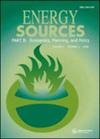Investigating the EKC hypothesis with nanotechnology, renewable energy consumption, economic growth and ecological footprint in G7 countries: panel data analyses with structural breaks
IF 2.2
4区 工程技术
Q3 ENERGY & FUELS
Energy Sources Part B-Economics Planning and Policy
Pub Date : 2023-01-05
DOI:10.1080/15567249.2022.2163724
引用次数: 18
Abstract
ABSTRACT This study investigates the relationship between nanotechnological innovations, renewable energy consumption, economic growth, and ecological footprint for G7 countries within the framework of the Environmental Kuznets Curve (EKC) hypothesis. The study employs panel cointegration tests with structural breaks from 1990–2018. Nanotechnology is expected to reduce environmental degradation by increasing renewable energy consumption and energy saving. In this context, nanotechnological innovations are an essential tool for sustainable development. However, the literature also emphasizes that nanoparticle emissions from nanotechnology can negatively impact human and environmental health in the long term, and these need to be analyzed. In this context, this study is the first to empirically examine the relationship between nanotechnological innovations, renewable energy consumption, economic growth, and ecological footprint within the framework of the EKC hypothesis. The outcomes affirm that all variables are integrated with the long term. The results show that the EKC hypothesis is valid only in the USA. Nanotechnological innovations have a reducing effect on environmental degradation in the USA, whereas; they have an increasing impact on environmental degradation in Italy and the United Kingdom. Renewable energy consumption enhances environmental quality in Italy, Japan, the United Kingdom, and the USA. Based on these empirical findings, the government should pioneer to development of new the lowest nanoparticle-emitting nanotechnologies. And that way, it will be possible to encourage energy savings and renewable energy consumption more safely, and the effectiveness of sustainable development policies will increase.G7国家纳米技术、可再生能源消费、经济增长和生态足迹对EKC假设的研究:结构断裂的面板数据分析
本文章由计算机程序翻译,如有差异,请以英文原文为准。
求助全文
约1分钟内获得全文
求助全文
来源期刊

Energy Sources Part B-Economics Planning and Policy
ENERGY & FUELS-
CiteScore
6.80
自引率
12.80%
发文量
42
审稿时长
6-12 weeks
期刊介绍:
12 issues per year
Abstracted and/or indexed in: Applied Science & Technology Index; API Abstracts/Literature; Automatic Subject Index Citation; BIOSIS Previews; Cabell’s Directory of Publishing Opportunities in Economics and Finance; Chemical Abstracts; CSA Aquatic Science & Fisheries Abstracts; CSA Environmental Sciences & Pollution Management Database; CSA Pollution Abstracts; Current Contents/Engineering, Technology & Applied Sciences; Directory of Industry Data Sources; Economic Abstracts; Electrical and Electronics Abstracts; Energy Information Abstracts; Energy Research Abstracts; Engineering Index Monthly; Environmental Abstracts; Environmental Periodicals Bibliography (EPB); International Abstracts in Operations Research; Operations/Research/Management Science Abstracts; Petroleum Abstracts; Physikalische Berichte; and Science Citation Index.
Taylor & Francis make every effort to ensure the accuracy of all the information (the "Content") contained in our publications. However, Taylor & Francis, our agents, and our licensors make no representations or warranties whatsoever as to the accuracy, completeness, or suitability for any purpose of the Content. Any opinions and views expressed in this publication are the opinions and views of the authors, and are not the views of or endorsed by Taylor & Francis. The accuracy of the Content should not be relied upon and should be independently verified with primary sources of information. Taylor & Francis shall not be liable for any losses, actions, claims, proceedings, demands, costs, expenses, damages, and other liabilities whatsoever or howsoever caused arising directly or indirectly in connection with, in relation to, or arising out of the use of the Content. Terms & Conditions of access and use can be found at http://www.tandfonline.com/page/terms-and-conditions .
 求助内容:
求助内容: 应助结果提醒方式:
应助结果提醒方式:


